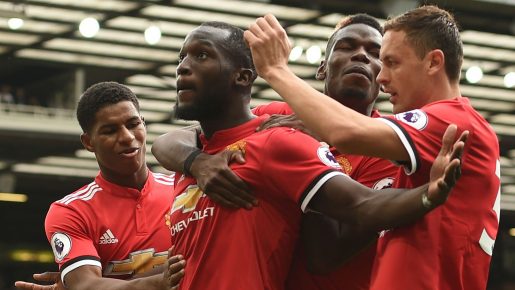When exactly did we all agree to this notion that Jose Mourinho is a “defensive coach”? It certainly didn’t come up in August when Manchester United started the season with back to back 4-0 wins. In fact, that it’s come up in the last few weeks or so – following Anfield – suggests that it’s become no more than a crutch, an excuse, for United’s dire attacking offerings in away games against genuine rivals.
It is obviously easier to proclaim: “..we came for a point…mission accomplished” than to admit “…we couldn’t get past them…we settled for a point”.
Mourinho certainly didn’t come across as a defensive coach when he arrived in England for his first Chelsea spell back in 2004. His first title winning team finished with 72 goals – 2nd only to Arsenal that season – and they matched that total as repeat champions the following season when they scored more goals than any team in the league.

Yes, those Chelsea teams were exceptionally good defensively – they conceded just 15 goals in 2004/05 – and although Mourinho was not averse to sometimes shutting a game down once ahead, it’s hard to recall that team setting up to play for a draw right from the off.
After that, his Scudetto winning Inter Milan side were top scorers in Serie A in 2009/10, and who could forget that his Real Madrid team set a new record with the 120 goals they plundered on the way to winning La Liga in 2012.
Even on his return to Chelsea in 2013, it was the same bold Mourinho. Chelsea played on the front foot more often than not, only reverting to more pragmatic means to preserve their lead in the run to another title in 2015, and again averaged 72 goals per season.
Yet, a meager return of 54 goals at United last season appears to have cemented Mourinho’s reputation as a safety-first defensive coach. But it wasn’t a lack of trying or defensive tactics that led to a lack of goals, but shortcomings in attack. A team boasting attacking talent like Zlatan Ibrahimovic, Marcus Rashford, Anthony Martial, and Henryk Mkhitaryan somehow ended the season scoring fewer goals than Bournemouth and Everton.
Defensive or not, Mourinho’s recent record in big Premier League games leaves much to be desired. Jamie Carragher dug into it on Monday Night Football the other night, highlighting Mourinho’s record in his last 10 away games against top-six rivals, stretching back to his last stint at Chelsea.
That five of those games ended in goalless draws lends some credence to a safety-first approach yet the other five ended in defeat for Mourinho’s team, suggesting it’s not, overall, been a very successful strategy, regardless of the pandering “defensive masterclass” headlines that tend to follow the barren draws.
More concerning should be the grand total of one goal scored by United in the last six of these games they’ve played under Mourinho. Whether this is a consequence of an overly negative approach, or just the failings of attacking tactics, it’s clearly not good enough for a team with title aspirations.
It is perfectly understandable to take on a superior team cautiously – be defensive, play on the counter – but, last season’s 6th place finish notwithstanding, does Mourinho really believe United are inferior to all of their top six rivals? Not likely. Not Mourinho. Bottom line: United’s attacking play has not been up to scratch in these big games.
Mourinho has been a success all his career and he won two Cups last season. But if that top six record doesn’t improve, he will not be adding to his Premiership title collection any time soon.









